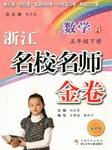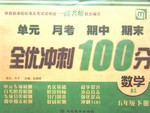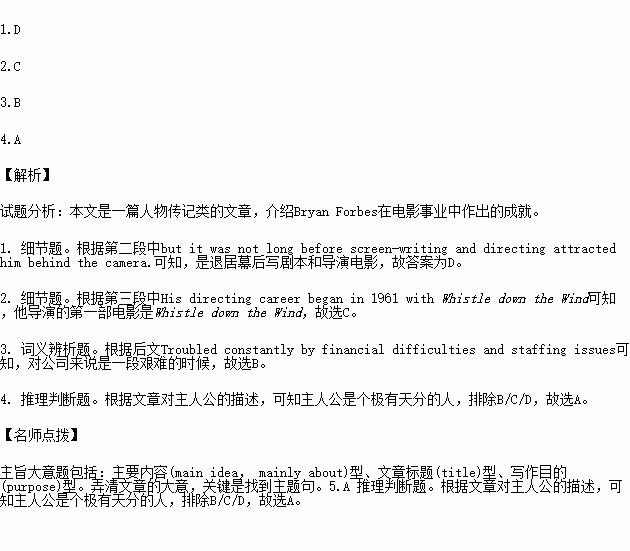题目内容
Bryan Forbes, who was born in London on 22 July 1926, made his first screen acting appearance in 1918.
He landed supporting parts in several outstanding British films, including An Inspector Calls (1954) and The Colditz Story (1955), but it was not long before screen-writing and directing attracted him behind the camera. Together with Richard Attenborough, he set up Beaver Films in 1959. Its first film, The Angry Silence (1960), was written by Forbes and Attenborough played the lead role.
His directing career began in 1961 with Whistle down the Wind, featuring child star Hayley Mills. Forbes directed many more films in the 1960s and early 1970s. In 1969 he took over as head of production and managing director of EMI—MGM Elstree, and the studio achieved outstanding successes. But it was a torrid time for the company. Troubled constantly by financial difficulties and staffing issues, Forbes quitted in 1971. He then directed The Step ford Wives, based on the novel by Ira Levin, and in 1975 International Velvet, starring Tatum O’Neal, in 1978.
Forbes, who counted the late Queen Mother among his friends, continued directing, writing and acting throughout the 1980s and early 1990s. He also found success as an author with a number of novels, the latest of which, The Soldier’s Story, was published last year.
After Forbes passed away, film critic Mark Kermode said, “Once I had fun—boyish pleasure of telling Bryan Forbes how much I loved Step ford Wives. He was charming and modest. A great loss.”
1.Having played several supporting roles, Forbes began to ________.
A. work as a cameraman
B. make a lead actor
C. build his own company alone
D. write and direct films
2.Which of the following is the first film directed by Forbes?
A. An Inspector CallsB. The Colditz Story
C. Whistle down the WindD. The Angry Silence
3.The underlined word “torrid” in Paragraph 3 can be replaced by ________.
A. suitableB. toughC. preciousD. steady
4.Which of the following can be best used to describe Forbes?
A. Talented.B. Well-educated.C. Proud.D. Attractive.
 浙江名校名师金卷系列答案
浙江名校名师金卷系列答案 全优冲刺100分系列答案
全优冲刺100分系列答案What is “Dads Make a Difference”?
A service-learning opportunity for teens that deals with fatherhood, parenting, and so on.
Older teens, grades 10—12, teach younger teens, grades 6—9, about the importance of fathers in children’s lives, the legal and financial responsibilities of parenting.
Teen teacher training goals & objectives
The goal of the teen teacher training is to better understand the complex problems surrounding legal fatherhood in our society. By discussing what makes healthy families, explaining the meaning of paternity(父亲的身份), and examining the risks people take in their lives, teens will develop the skills needed to make informed decisions in their own relationships and, finally, teach this information to others.
What’s in it for me?
An opportunity to:
Learn life skills like communication, decision making, and problem solving.
Get the chance to use knowledge in meaningful and effective ways.
Develop leadership, planning, teamwork, time management, and organizational skills to help you in every aspect of your life.
Forming lasting relationships with adult mentors(导师).
Comments from teen teachers
“ ‘Dads Make a Difference’ made me realize how permanent and expensive parenthood is.”
“Speaking in form of groups and directing people in activities, I feel, is a valuable skill to have that I will use throughout my life.”
“I wish I would have gone through this program when I was in Junior High. I know it would have helped me to really think about the future and to make good decisions.”
“ ‘Dads Make a Difference’ has helped me to know the effects of my actions before I take them and I know what risks not to take to protect my future.”
1.“Dads Make a Difference” is a(n)_____.
A. name of a school | B. training center |
C. social organization | D. education program |
2. “Dads Make a Difference” can _____.
A. provide teens a chance to be a teacher in Junior High
B. help teens learn more about parents
C. help teens develop their life skills
D. advise teens how to avoid risks in life
3.According to the passage, who will benefit most from “Dads Make a Difference”?
A. fathers and sons | B. mothers and daughters |
C. teen teachers and adult mentors | D. teens and societies |

